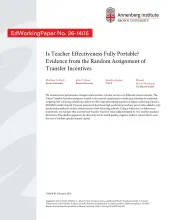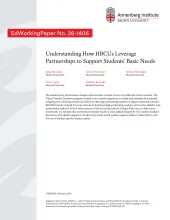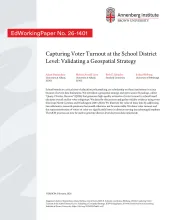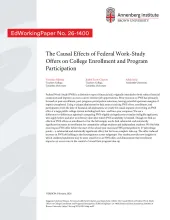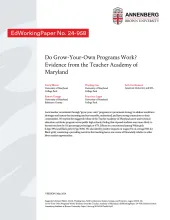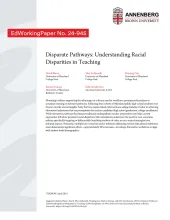The Trusted Source for Emerging Education Research
Researchers and policymakers can both benefit from timely access to research. EdWorkingPapers is a platform for prompt and open dissemination of high-quality studies. By connecting researchers and informing policymakers, the series accelerates progress in education.
Learn more about the platform →
Submit a paper
Have a paper you wish to post? Check out the EdWorkingPapers' scope and FAQs, and then submit your manuscript.
NEW EdWorkingPapers
Is Teacher Effectiveness Fully Portable? Evidence from the Random Assignment of Transfer Incentives
We examine how performance changes when teachers transfer across very different school contexts. The Talent Transfer Initiative program created a rare natural experiment to study such transfers by randomly assigning low-achieving schools the ability to offer high-performing teachers at higher-achieving schools a $20,000 transfer stipend. Forecast tests show that these high-performing teachers… more →
Understanding How HBCUs Leverage Partnerships to Support Students’ Basic Needs
Basic needs insecurity has become a pressing equity issue in U.S. higher education, yet little research examines how historically Black colleges and universities (HBCUs) address students’ holistic needs. Guided by a practice-based, pragmatic analytic orientation and informed by a basic needs services implementation rubric and an HBCU-based theoretical model, this qualitative case study… more →
Capturing Voter Turnout at the School District Level: Validating a Geospatial Strategy
School boards are critical sites of education policymaking, yet scholarship on these institutions is scarce because of severe data limitations. We introduce a geospatial strategy and open-source R package, called “Query, Overlay, Recover” (QOR), that generates high-quality estimates of voter turnout in school board elections overall and for voter subgroups. We describe this process and gather… more →
The Causal Effects of Federal Work-Study Offers on College Enrollment and Program Participation
Federal Work-Study (FWS) is a distinctive type of financial aid, originally intended to both reduce financial constraints and improve access to career-relevant job opportunities. Prior research on FWS has primarily focused on post-enrollment, post-program-participation outcomes, leaving potential upstream margins of impact unexplored.
Localized Teacher Recruitment through “Grow-Your-Own”: Impacts of the High School Teacher Academy of Maryland Program
Recruiting teachers via “grow-your-own” (GYO) programs is a popular, yet rarely evaluated, strategy for addressing local workforce shortages and ensuring that incoming teachers resemble, understand, and have strong connections to their communities. We provide novel evidence on the impacts of one such GYO program by exploiting the staggered rollout of the Teacher Academy of Maryland Career… more →
Disparate Pathways: Understanding Racial Disparities in Teaching
Long standing evidence on the importance of a diverse teacher workforce prompts policymakers to scrutinize existing recruitment pathways.
Policy and Practice Series
Webinar Series
The Bigger Picture: Key Trends in America’s Changing Education Landscape
Are the enrollment and achievement declines we’re seeing just pandemic fallout, or something deeper? The papers featured in this webinar provide essential context for evaluating common narratives about recent changes in student achievement and enrollment.
